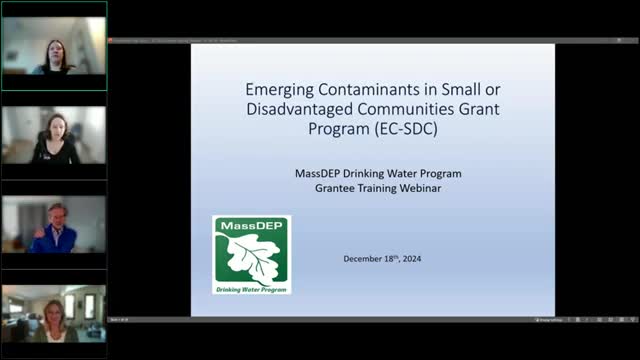MassDEP reviews ECSDC grant rules, reporting and technical assistance for small water systems
Get AI-powered insights, summaries, and transcripts
Subscribe
Summary
Massachusetts Department of Environmental Protection staff and UMass Amherst outlined grant timelines, invoicing and reporting rules, and technical-assistance and lab services available to Emerging Contaminants in Smaller Disadvantaged Communities (ECSDC) grantees during a program webinar.
Massachusetts Department of Environmental Protection (MassDEP) staff on a training webinar reviewed administrative and technical requirements for public water systems awarded funds under the U.S. Environmental Protection Agency’s Emerging Contaminants in Small or Disadvantaged Communities (ECSDC) grant program and described technical-assistance resources available through UMass Amherst.
The ECSDC grant program, funded by the federal Bipartisan Infrastructure Law, provided Massachusetts $38,204,000 for federal fiscal years 2022–2023 and $19,249,000 for fiscal year 2024; MassDEP said projects funded by the 2022–2023 allocation run through September 2029, while 2024 awards run through 2030. "ECSDC provides states and territories with grants to public water systems in small or disadvantaged communities to address emerging contaminants," said Abby Jacobs, ECSDC grant program manager for MassDEP’s Drinking Water Program.
Why it matters: the webinar covered steps grantees must take to move from award letters to reimbursement, documentation that must accompany invoices and reports, federal compliance rules that may apply to some construction projects, and technical services available to grantees to support pilot testing and design.
MassDEP walked grantees through the contract and invoicing process, including a new project-specifications document that will summarize each project and an invoicing cover sheet grantees must submit with reimbursement requests. Jacobs described the invoicing cover sheet fields — organization letterhead, reimbursement-request number, cost-incurred dates, a table listing vendor invoices with invoice dates and amounts, and a balance-of-award table showing award amount, previous reimbursements and remaining balance. An example used during the webinar showed a sample award of $65,000 in the template.
Grantees must file a one-page monthly progress report by the 15th of the month following the reporting period, Jacobs said; the monthly report flags delays, changes in status or personnel, and any changed project details. A final report, which MassDEP may require before releasing the last 10% of grant funds, should summarize accomplishments, include data or photos where available, and list lessons learned.
The webinar summarized federal requirements that can affect certain projects. Build America, Buy America (BABA) applies to construction or infrastructure projects with grant-funded construction costs above $250,000; Jacobs said compliance is demonstrated with bid or design documents listing materials and manufacturer certifications. MassDEP staff said BABA typically does not apply to sampling, testing, planning or design-only projects, and that grantees may pursue EPA waivers where applicable.
MassDEP announced a change to signage requirements: per recent EPA guidance, new ECSDC awards will not include the prior federal signage/publicity language. Jacobs said MassDEP will remove that language from supplemental contract terms for new awards and will evaluate existing awards case by case; unspent signage funds may be re-budgeted to other eligible ECSDC activities.
Flood-risk and cybersecurity obligations were highlighted for projects involving new or substantially improved structures or operational technology. Jacobs said projects that construct new above-ground structures, substantially improve facilities (work exceeding 50% of value), or are within mapped floodplains must follow applicable flood-risk management documentation (for example, using the state’s Climate Resilience Design Standards tool and providing flood-insurance documentation where required). For projects with operational-technology components that are or may be connected to networks, grantees must provide a cybersecurity certification showing an assessment or register to obtain a free assessment from the Cybersecurity and Infrastructure Security Agency (CISA) and complete any required certification statements.
Permitting and environmental review: Jacobs said grantees are responsible for obtaining required local, state or federal permits, including MassDEP forms for distribution modifications, new sources, treatment-plant changes, pilot testing, chemical retrofits and well-driller notifications. The presentation referred to the Massachusetts Environmental Policy Act (MEPA) for state-level environmental review; MEPA jurisdiction and thresholds (for example, certain wetland work, large withdrawals or plants over 1,000,000 gallons per day) are determined during design and before permitting. (The webinar transcript mistakenly referred to MEPA as “NEPA”; the correct state statute is the Massachusetts Environmental Policy Act, MEPA.)
Technical assistance from UMass Amherst: Hannah Parson, UMass program manager, said UMass Amherst and MassDEP staff offer help with project planning, scope-of-work and budget preparation, eligibility documentation, and navigating reporting, permitting and compliance requirements. UMass also offers laboratory and pilot-testing services — jar testing, rapid small-scale column testing, bench-scale pilots and use of a Mobile Water Innovation Laboratory for on‑site pilot testing — on a case-by-case basis for grantees.
Other administrative notes included a 72-hour turnaround expectation for routine MassDEP communications, a $1,000,000 fiscal-year audit threshold for some projects, and contacts for contracting or invoicing questions. Jacobs and Parson repeatedly directed grantees to submit questions to the program director email for routing to appropriate staff.
The webinar moved to a question-and-answer session after the presentation. MassDEP said it will circulate the new project-specifications form and updated invoicing template to grantees and will post future trainings for broader audiences in coming weeks.
